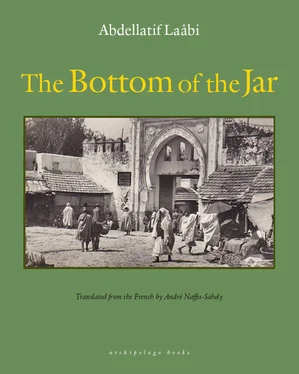No, no, he told himself — putting that idea definitively to rest. May God curse the religion of money.
THE SUMMER LINGERED on, and despite various activities, Namouss once again found himself in a languorous state. Something was missing and he couldn’t figure out what it was. School? Patience, that would start up again soon. Traveling? Of course, but he was realistic enough to know it wouldn’t happen anytime soon. His parents’ love? He had it, even if the outward signs of affection were few and far between, often indirect, and for the most part unexpected. Friends? He had the members of his gang, for what they were worth, who at least provided recourse when solitude weighed him down or when the atmosphere in the house became insufferable. What was it then? Maybe what he lacked was a kindred spirit in whom he might confide his big secret or, without even going that far, someone with whom he might share the crazy ideas that ran through his mind — the incomprehensible images that flashed past his eyes during his waking dreams, or the voices he heard, which came, as they say, from another world — or even talk with about the tingling that was electrifying his body, those sweet waves that flooded over him, the longing he felt for a hand, a truly tender hand, for someone whose scent and breath might mingle with his just before going to sleep. Having stirred all that up, nothing came of it. Having reached the limits of his imagination, he came down from the clouds and landed on the patio.
Ghita was there, seated on a little mattress, all dressed up, as if for a special occasion, with a saffron-yellow scarf wrapped around her head. She’d arranged all the sorry-looking scraps of makeup she owned on an embroidered handkerchief she’d spread out on the floor: a vial of kohl, a bit of souak (walnut bark), a terra-cotta saucer coated with a thin layer of rouge. She began the ritual by brushing her teeth very attentively with the bit of souak , stopping only once she’d reduced the bark to a few strings, which she then chewed before spitting them out. While her teeth had certainly become a lot whiter, her fingers were now black. Then came the actual makeup. She wet a tissue wrapped around her index finger with a bit of saliva and dipped it into the rouge. After quickly dabbing her cheeks three times with it, she spread it out evenly over the rest of her face. Then she went back to her cheeks, and by virtue of scrubbing away repeatedly at them, they attained a more natural color. Curiously, this modicum of discretion did not apply when it came to her lips, which she painted thickly, perhaps because they were thin and — in a burst of coquettishness — she wanted to emphasize what she considered one of the key features of beauty. She looked at herself in the mirror to ensure everything had gone according to plan and moved on to the next step, which she approached with caution. When it came to kohl, Ghita found herself swimming in a sea of contradictions. After becoming “blind to her hands,” as she was fond of saying, she would dry her tears and move on to her eyebrows. Once more, what little discretion she had flew out the window. Light and thin to start with, her eyebrows grew thicker and fuller until they hung above her eyes like bountiful crescents.
“Well, how do I look, you little jinni?” she asked Namouss, who’d followed the procedure from start to finish.
Not knowing how to answer her, he instead asked, “What’s all this for? Are you going out?”
“What’s it got to do with you? Don’t you know today is the day of Lalla Mira?” 9
“Who is Lalla Mira? Some sort of ghoul like Aïcha Kandisha?” 10
“May your lips go numb! I never want to hear you mention the name of that scrap of carrion again, otherwise she will come and eat you and pick her teeth clean with your bones. Lalla Mira is a real Muslim. She is the spirit that dwells within us and who watches over us. Oh Lalla Mira, taslim , I surrender to you. Here I am, just as you like, wearing your color on my head. Keep evil away from me and my children, and may the evil eye go blind before it manages to reach us. Taslim! Taslim !”
Failing to understand a single word of this gobbledygook, Namouss persevered: “So you’re going out?”
“Yes, I’m going out. So what?”
“I want to go with you.”
“Do as you wish. I need to ‘chill my jinn’ and so I’m going to a Gnaoua 11 hadra .” 12
Thinking it would be a party with lots of musicians, Namouss’s resolve to follow his mother strengthened.
UNLIKE DRISS, WHO ran rather than walked, Ghita was so slow it was as if she were walking on eggs. From behind, Namouss was grumbling about the lack of progress. Moreover, judging by how indifferent she seemed, he wasn’t sure whether she had really agreed to his accompanying her. He therefore kept close, putting up with her impossibly slow pace and reminding her of his presence from time to time by gently tugging on the sleeve of her djellaba. This drama lasted until they reached the climb of the Grenadiers. Ghita, who already had a good deal of trouble walking on the cobblestones when they were flat, went wobbly at the thought of the difficult stretch ahead. She resolved to elicit Namouss’s help, who was only too glad to lend a hand. Bolstered by such recognition, he gave her his hand and stood to his full height to offer his shoulder.
“Where are we going?” he asked, hoping to cement the pact.
“Don’t muddle my mind with your questions,” she replied, “and careful where you put your feet, otherwise you’re going to make us fall.”
Panting, they reached the top of the climb. Prone to sudden reversals, Ghita took a left down Lemtiyine and said, “Let go of my hand now. I can walk by myself. You think my bones have crumbled away or something? I’ve still got my own wings and I can come and go, rise and fall. The blade’s still sharp enough to chop the onion. Let’s go, we’re almost there.”
Lemtiyine! That was where Namouss’s school was. Could that be where the hadra was being held? What were Gnaoua musicians doing in Mr. Fournier’s inner sanctum? Would Mr. Benaïssa join in and play his flute? Indifferent to her son’s speculations, Ghita passed by the school without giving it a second glance. Her stride grew more confident. She sped up, took the first corner on the right, and almost started running. Namouss chased after her. They wound up in a little square and Ghita immediately rushed into a gloomy alley, shouting, “I can’t hold it any longer. Stay where you are and keep a lookout.”
A moment later came a psss . ., then a char . . rr ; and Namouss, taken aback at first, guessed what was going on. A sudden panic seized him. What if a “stranger” were to pop out of nowhere? Would his mother have to time to finish and make herself presentable? It would be a catastrophe! Barely had he formulated these fears when a big fellow came out of the alley holding up the ends of his djellaba while shouting, “Women have lost all sense of shame and decency. Satan holds full sway over their minds. Puh !”
He stormed off looking furious.
A few interminable seconds passed before Ghita reappeared, her expression cheerful, making this trivial observation: “Allah, I felt like I was going to burst! What a relief! Well then, get going. It’s just here.”
In the fever of the preceding event, Namouss hadn’t even noticed the noises that were coming from the house his mother was now pointing out to him. It was a sacred din, where he recognized the beating of drums and the gravelly clatter of rattles. Namouss had often witnessed impromptu performances and acrobatic displays by Gnaoua musicians in Bab Guissa and Joutiya. Their musical style was very different from the usual Andalusian tunes that saturated the airwaves on Fridays and holidays. If Gnaoua rhythms were rollicking and visceral, Andalusian ones were gentle and melodic to the point of being soporific. Caught between these two extremes, Namouss had a penchant for a third genre, the melhoun , where the singer at least told a story and did so in the colloquial spoken in Fez. But what had chiefly drawn Namouss to this genre had undoubtedly been a particular song from his repertoire: “The Ballad of Ghita.” He’d been disconcerted when he’d heard it for the first time. Someone was singing on the radio and addressing his mother by her name. What sorcery had he used to find out she was called Ghita? Driss, who had been there at the time, picked up the refrain and sang along, clapping his hands, throwing his wife knowing looks, drawing her attention to a certain verse that enchanted him: “Listen Ghita, pay attention to the sense and the subtleties.”
Читать дальше












